Reports of the Forum
Working on a Trilateral Approach for “Water as leverage” (2022)
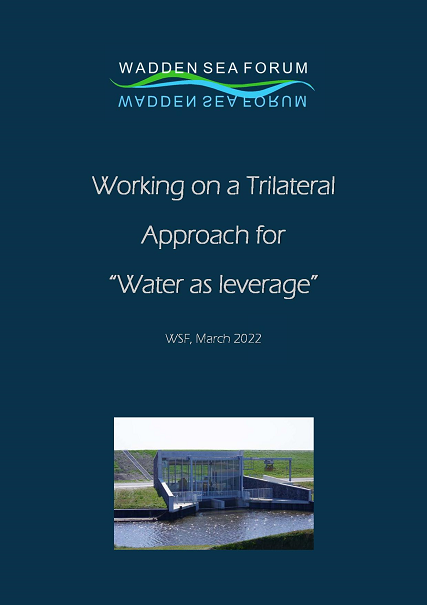
Climate change is a fast growing threat affecting the Wadden Sea Region with the World Heritage site Wadden Sea and its hinterland, where people live, work and recreate. The WSF took a closer look on the impacts of climate change to the hinterland, emphasizing that climate change is an inclusive challenge for the entire WSR affecting both the areas in front of and the cultivated landscape behind dikes. As the society in general is used to keep their traditions, changes in behaviour and perceptions need to be initiated and supported in a slow but long lasting process. Herein, the “Water as Leverage” methodology introduced by the Program towards a rich Wadden Sea (PRW) offers a promising approach. The WSF was asked to support the percolation of this approach into the Wadden Sea Region. Consequently, this report has been prepared under the auspice of the PRW in The Netherlands. This report reflects on the outcomes of the development process (Nov 2021 to March 2022) for implementing a “trilateral community (of understanding) on water management”. Download the full report
Round Table "Shipping Safety" - Trilateral Stakeholder Analysis (2020)
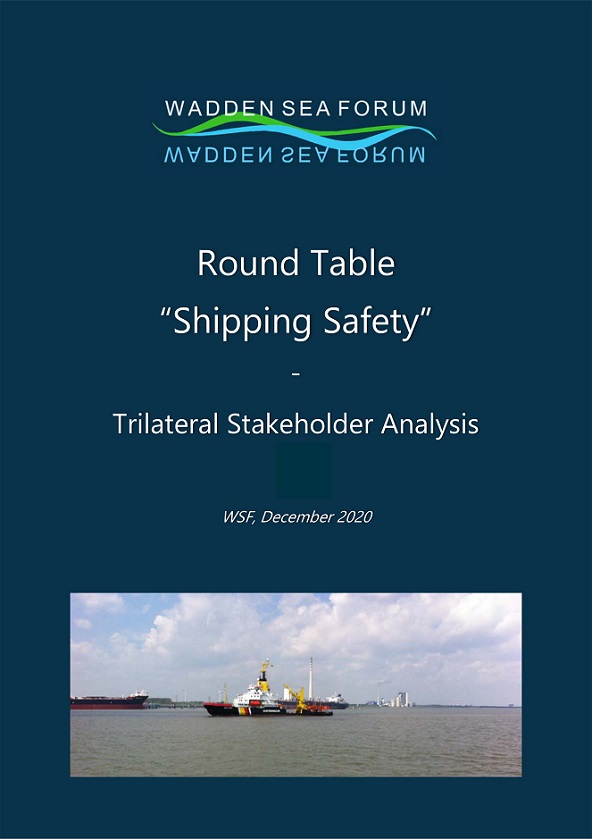
Download the full report
Dark Skies Above the UNESCO Wadden Sea World Heritage (2020)
Inventory of activities regarding the reduction of light emissions
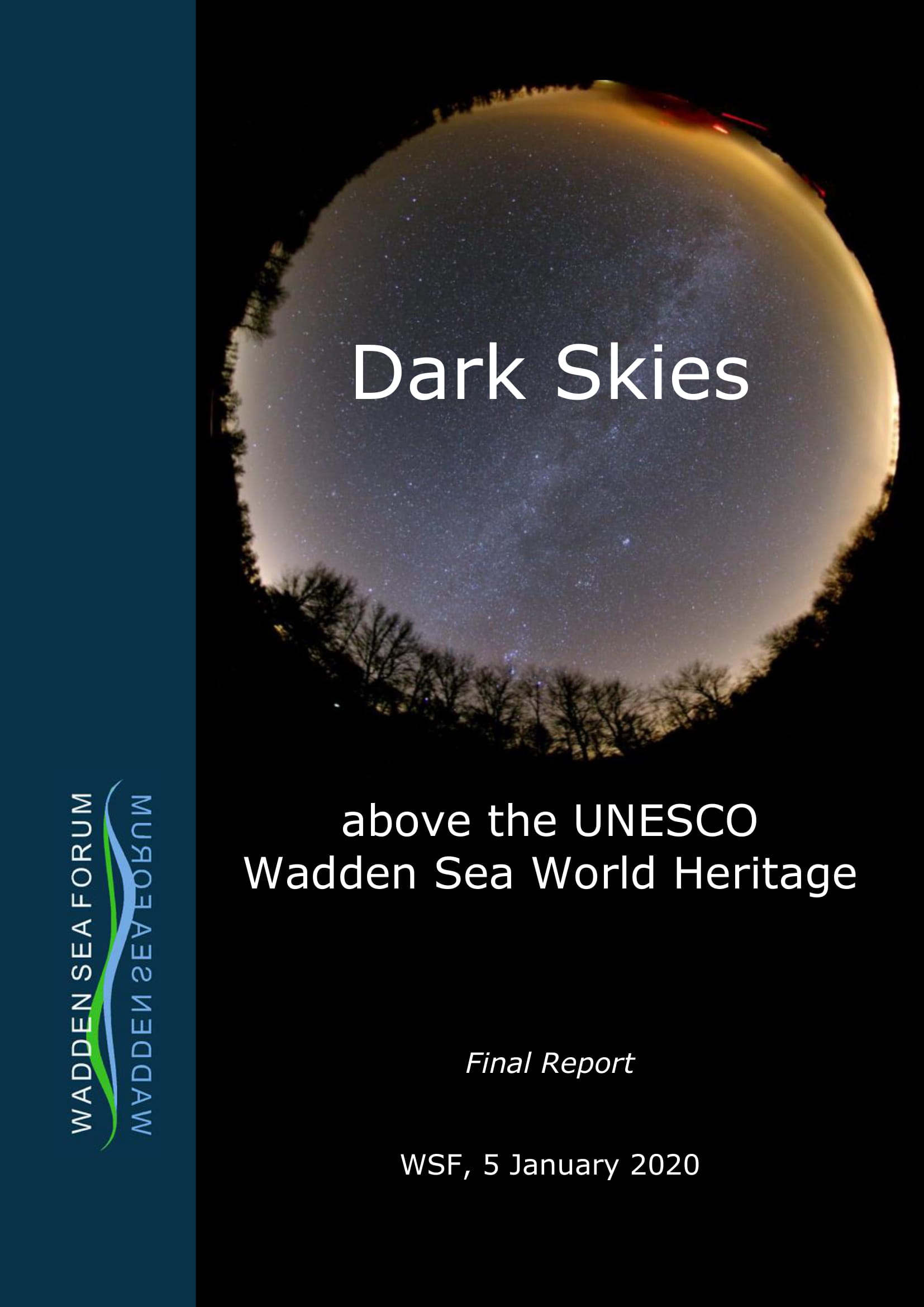
Dark sky project proposal, final report
Download the full report
WSF Policy Paper "Surface Water Management" (2019)
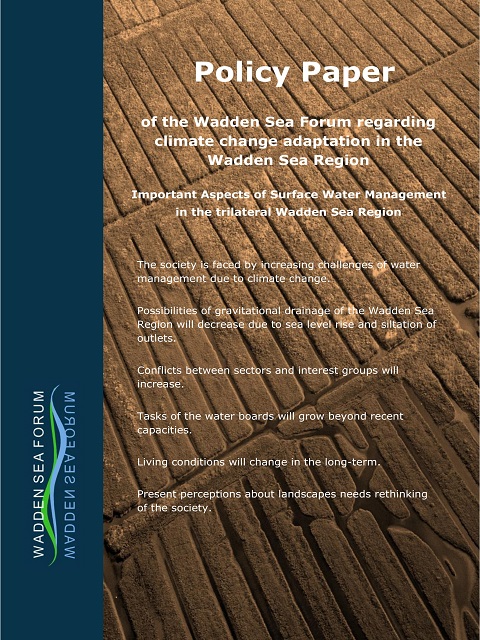 "Policy Paper of the Wadden Sea Forum regarding climate change adaptation in the Wadden Sea Region - Important aspects of surface water management in the trilateral Wadden Sea Region"
"Policy Paper of the Wadden Sea Forum regarding climate change adaptation in the Wadden Sea Region - Important aspects of surface water management in the trilateral Wadden Sea Region"
Climate change is a fast growing threat impacting the Wadden Sea Region (WSR) with the Wadden Sea World Heritage Site and its hinterland, where people live, work and recreate. The Wadden Sea Forum has elaborated a policy paper on challenges of water management in the Wadden Sea Region due to climate change. The paper reflects the view of the different stakeholders of the WSF and is forwarded to responsible organisations and decision makers to consider WSF recommendations in their dealings.
The policy paper is available in the languages English, German, Nederlands, Danish.
WSF Resolution Goose Management (2019)
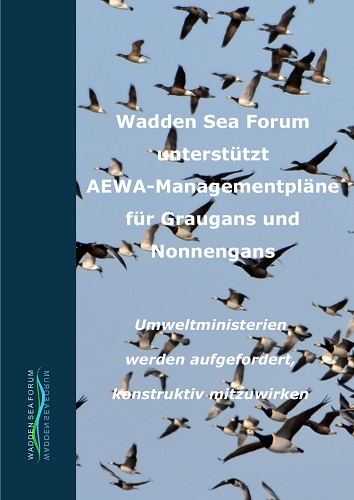 The WSF plenary discussed in its meeting on 18-19 November the process of implementing the AEWA management plans for Greylag and Barnacle geese on flyway level. These management plans were adopted by the range states in December 2018. For the implementation in the different countries Favorable Reference Values (FRVs) have to be defined. As this process is lacking, the WSF elaborated a resolution, which requests the responsible ministries to speed up the process and support the AEWA concept. The Meeting adopted the resolution without any vote of dissent. (see more information and document)
The WSF plenary discussed in its meeting on 18-19 November the process of implementing the AEWA management plans for Greylag and Barnacle geese on flyway level. These management plans were adopted by the range states in December 2018. For the implementation in the different countries Favorable Reference Values (FRVs) have to be defined. As this process is lacking, the WSF elaborated a resolution, which requests the responsible ministries to speed up the process and support the AEWA concept. The Meeting adopted the resolution without any vote of dissent. (see more information and document)
Developments in the Wadden Sea Region reflecting the role and achievements of the Wadden Sea Forum (2018)
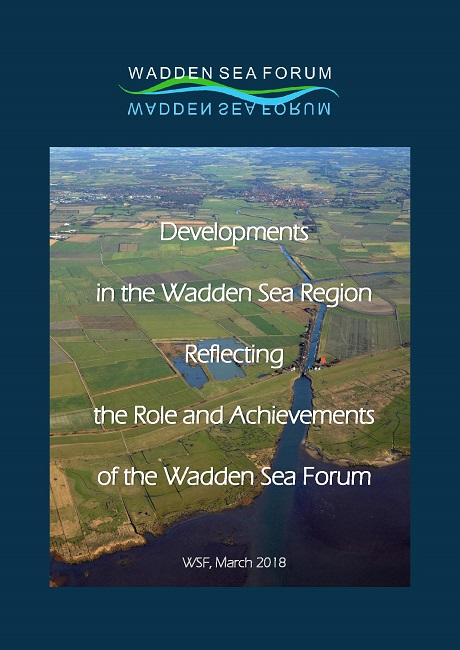
The WSF has elaborated a report about developments in the Wadden Sea Region, including status reports about the work on demographic change and sustainability indicators. The approach for this report was to consider the objectives and statements of the political level, expressed in the Ministerial Declaration of the Trilateral Governmental Conference 2014 in Tønder, Denmark. Taking this approach into account, this report recalls those statements of the Tønder Declaration, relevant for socio-economic developments and stakeholder involvement in the Wadden Sea Region, assesses the main developments accordingly and presents recommendations of the WSF stakeholders for future actions.
download full report including:
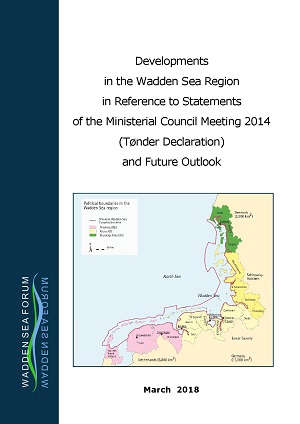 Developments in the Wadden Sea Region in Reference to Statements of the Ministerial Council Meeting 2014 (Tonder Declaration) and Future Outlook
Developments in the Wadden Sea Region in Reference to Statements of the Ministerial Council Meeting 2014 (Tonder Declaration) and Future Outlook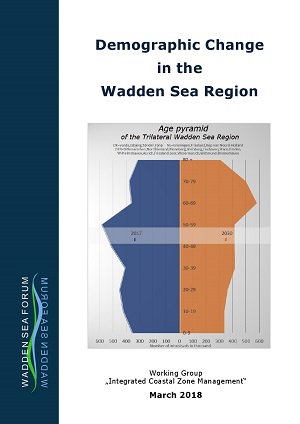 Demographic Change in the Wadden Sea Region
Demographic Change in the Wadden Sea Region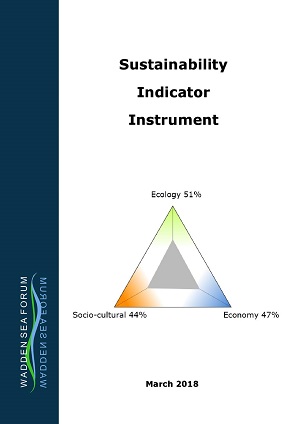 Sustainability Indicator Instrument
Sustainability Indicator Instrument
Development and Analysis of Sustainability Indicators (2018)
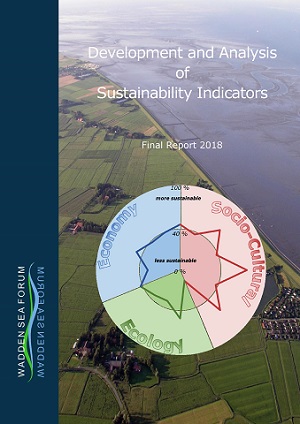 Project funded by Niedersächsische Wattenmeer Stiftung. In 2016, the WSF in cooperation with the Dutch Wadden Academy and the University of Kiel, collected data on indicators for all German coastal municipalities. Now there was a data set of about 60 indicators...
Project funded by Niedersächsische Wattenmeer Stiftung. In 2016, the WSF in cooperation with the Dutch Wadden Academy and the University of Kiel, collected data on indicators for all German coastal municipalities. Now there was a data set of about 60 indicators...
more information under topics/core-issues/sustainability-indicators
A CO2 neutral Waddensea Region (2016)
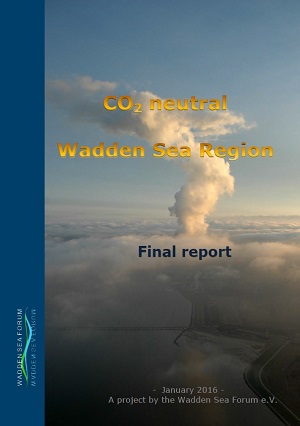 A project with financial support from the German Federal Government Budget. To develop the Wadden Sea region by 2030 into a CO2-neutral region is an ambitious goal, which needs the support of the entire region with their industry associations, environmental and conservation organizations and social institutions as well as the local and regional politicians. In order to reach the aim of the project, elaborating recommendations and advice on measures for the development of climate-friendly Wadden Sea Region (WSR), regional characteristics and development options...
A project with financial support from the German Federal Government Budget. To develop the Wadden Sea region by 2030 into a CO2-neutral region is an ambitious goal, which needs the support of the entire region with their industry associations, environmental and conservation organizations and social institutions as well as the local and regional politicians. In order to reach the aim of the project, elaborating recommendations and advice on measures for the development of climate-friendly Wadden Sea Region (WSR), regional characteristics and development options...
more information under topics/energy transition
ICZM Strategy (2014)
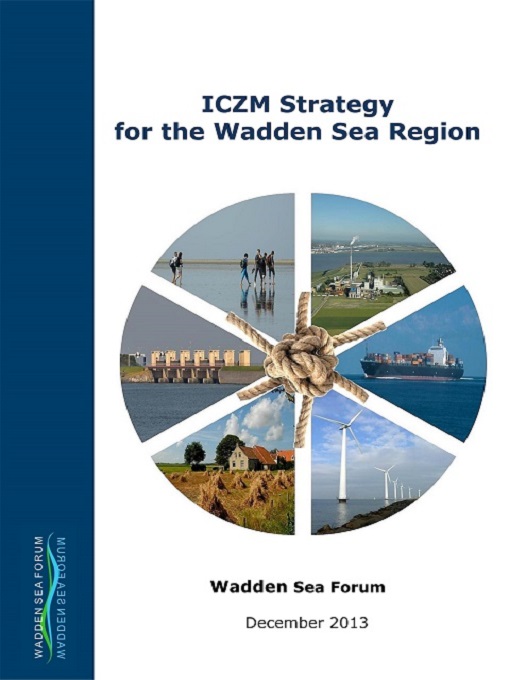 This document explains the WSF ICZM strategy from two perspectives: One by framing WSF activities within the ICZM concept, including links to Marine Spatial Planning; two, by assessing its existing vision document "Breaking the Ice" from 2005 to develop its idea of future development for the Wadden Sea Region. Chapter 1.2 defines where this strategy aims to be relevant.
This document explains the WSF ICZM strategy from two perspectives: One by framing WSF activities within the ICZM concept, including links to Marine Spatial Planning; two, by assessing its existing vision document "Breaking the Ice" from 2005 to develop its idea of future development for the Wadden Sea Region. Chapter 1.2 defines where this strategy aims to be relevant.
more information under topics/core-issues/coastal-management
Goose Management Scheme (2014)
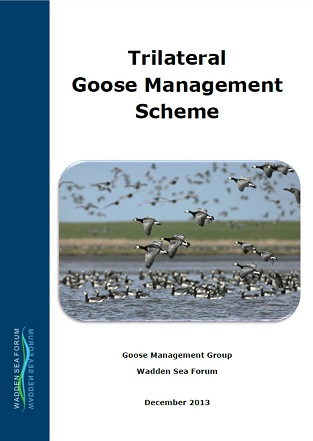 The proper management of geese is an issue of increasing relevance in the Wadden Sea Region mainly due to increasing numbers of geese and improved agricultural crops favored by geese...
The proper management of geese is an issue of increasing relevance in the Wadden Sea Region mainly due to increasing numbers of geese and improved agricultural crops favored by geese...
more information under topics/core-issues/goose-management
WSF Without Frontiers (2010)
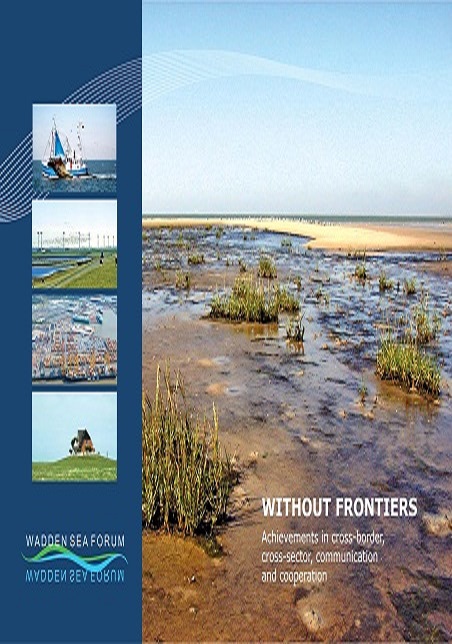 "Achievements in cross-border, cross-sector, communication and cooperation"
"Achievements in cross-border, cross-sector, communication and cooperation"
The Wadden Sea Forum has succeeded in widening the sector and cross-sector dialogues across the boundaries of Denmark, Germany and The Netherlands. Due to the latest developments, the WSF has extended the area of cooperation by integration of the North Sea EEZs of Denmark, Germany and The Netherlands.
The WSF intends to put more value on and to further improve the “forum aspect” of its work, i.e. the mutual exchange of information, ideas and visions within the plenary and the working group meetings. Whenever possible and requested by all sectors involved, a platform for discussions and negotiations on conflict issues will be provided. The WSF will also strive to improve cooperation with the Wadden Sea Advisory boards and organizations such as KIMO and Euregio die Watten. Information exchange as well as advice in both directions will support common goals, which will become even more important with the development of a sustainable tourism strategy.
For a sustainable development of the WSR it will be necessary, besides a vertical cooperation to aim for horizontal cooperation. This will better integrate experts from all sectors as well as all responsible ministries and authorities. print quality, 16,8 MB
Goose Management Plan (2010)
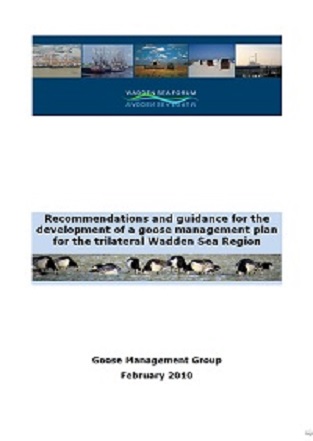 Goose populations have recovered from very low levels a few decades ago and new breeding populations have established in the WSR. These are recognized as natural assets and an important ecosystem component of the Wadden Sea Region. The conflicts with the agricultural sector can be resolved by fully involving farmers in cross-border goose management schemes, including the making of adequate payments for their management efforts...
Goose populations have recovered from very low levels a few decades ago and new breeding populations have established in the WSR. These are recognized as natural assets and an important ecosystem component of the Wadden Sea Region. The conflicts with the agricultural sector can be resolved by fully involving farmers in cross-border goose management schemes, including the making of adequate payments for their management efforts...
read more under topics/core-issues/goose-management
Integrated Coastal Zone Management (ICZM) in the Wadden Sea region (2009)
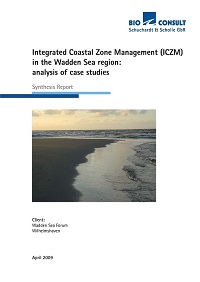 The aim of the “Project Analysis ICZM Cases” is to identify successes and deficiencies in the application of ICZM as an instrument for achieving sustainable development in the Wadden Sea Region. The results of the project will be discussed at a WSF workshop in 2009 and the outcome of this workshop, if appropriate and after adoption by WSF, will be forwarded as WSF recommendations to governments and the EU Commission. To this end 8 cases have been described and analyzed, according to the 8 principles from the EU ICZM recommendation (EU 2002)...
The aim of the “Project Analysis ICZM Cases” is to identify successes and deficiencies in the application of ICZM as an instrument for achieving sustainable development in the Wadden Sea Region. The results of the project will be discussed at a WSF workshop in 2009 and the outcome of this workshop, if appropriate and after adoption by WSF, will be forwarded as WSF recommendations to governments and the EU Commission. To this end 8 cases have been described and analyzed, according to the 8 principles from the EU ICZM recommendation (EU 2002)...
"Integrated Coastal Zone Management (ICZM) in the Wadden Sea region: analysis of case studies"
by BioConsult, Schuchard & Scholle GbR (April 2009)
Inventory and analysis of impacts of power plants in the Wadden Sea region (2009)
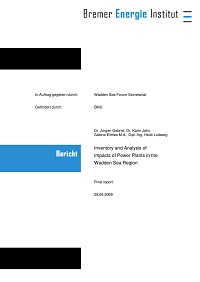 The WSF working group "Energy-Industry-Infrastructure" is dealing with the development and its impacts in this field. The main focus is planning and development of energy supplying facilities, with a particular interest on offshore wind energy, and its ecological and economic conse-quences. An inventory and analysis of all existing plants and their development was commissioned by the Bremer Energie Institut....
The WSF working group "Energy-Industry-Infrastructure" is dealing with the development and its impacts in this field. The main focus is planning and development of energy supplying facilities, with a particular interest on offshore wind energy, and its ecological and economic conse-quences. An inventory and analysis of all existing plants and their development was commissioned by the Bremer Energie Institut....
"Inventory and analysis of impacts of power plants in the Wadden Sea region"
Study of Bremer Energie Institut, (98pp, English, 1,5 MB)
WSF Strategy "Breaking The Ice" (2005)
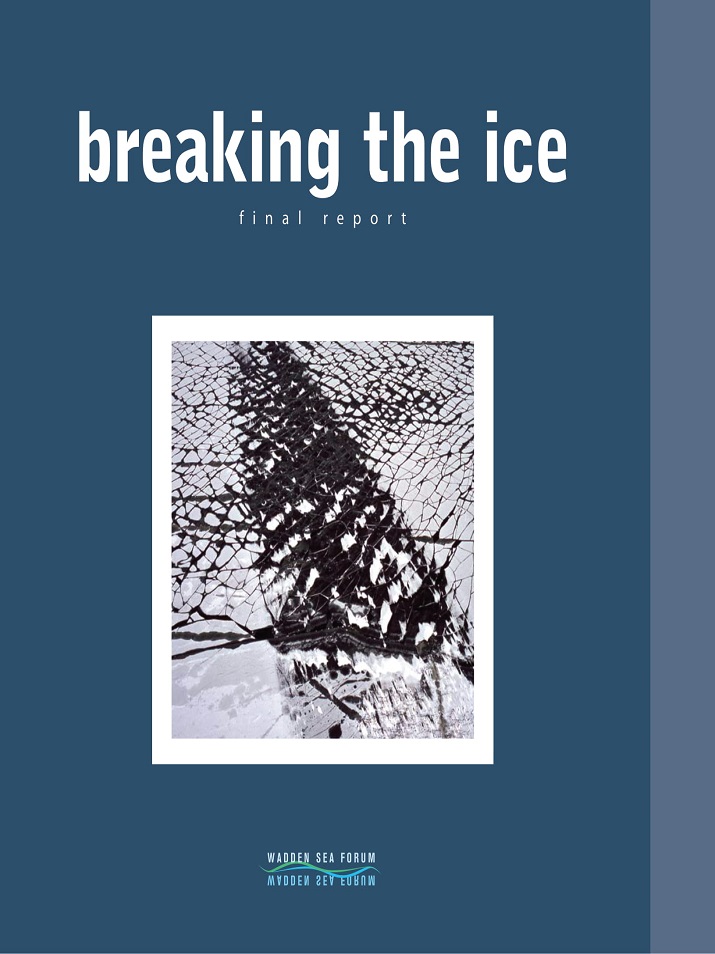 The Wadden Sea Forum Strategy "Breaking the Ice" was elaborated in the first phase of the WSF 2002 - 2005. It outlines the starting points for sustainable development perspectives of the Wadden Sea Region:
The Wadden Sea Forum Strategy "Breaking the Ice" was elaborated in the first phase of the WSF 2002 - 2005. It outlines the starting points for sustainable development perspectives of the Wadden Sea Region:
- A Common Vision
- Wadden Sea Region Integrated Coastal Zone Management Strategy
- Common Objectives
- Overarching issues: Infrastructure, Coastal Defence and Shipping Safety
- Strategies for Agriculture, Energy, Fisheries, Industries, Harbours and Tourism.
(English, print quality, 76pp, 3,2 MB)
(German, 76pp, 1,6 MB)
(Dansk, 76pp, 1,5 MB)
(Nederlands, 76pp, 1,5 MB)
WSF Brochure (2004)
 This brochure aims to inform you about the work of the Wadden Sea Forum (WSF). The concept of sustainable development is on everyone's lips and has also found its way into many official documents. However, one thing has proven to be not so easy: to know what this means in terms of practical application...
This brochure aims to inform you about the work of the Wadden Sea Forum (WSF). The concept of sustainable development is on everyone's lips and has also found its way into many official documents. However, one thing has proven to be not so easy: to know what this means in terms of practical application...
Die Wattenmeerregion (36pp, Deutsch, 9,3 MB)
De Waddenzeeregio (36pp, Nederlands, 6 MB)
 WSF Brochure: VadehavsForum's forslag (28pp, Dansk, 1,6 MB)
WSF Brochure: VadehavsForum's forslag (28pp, Dansk, 1,6 MB)


